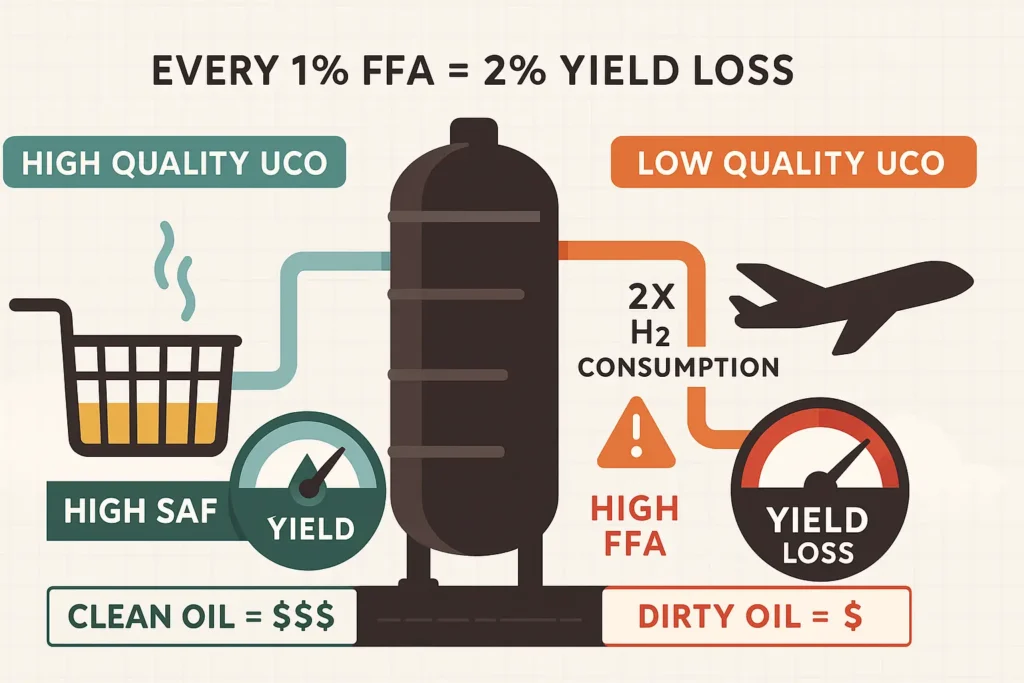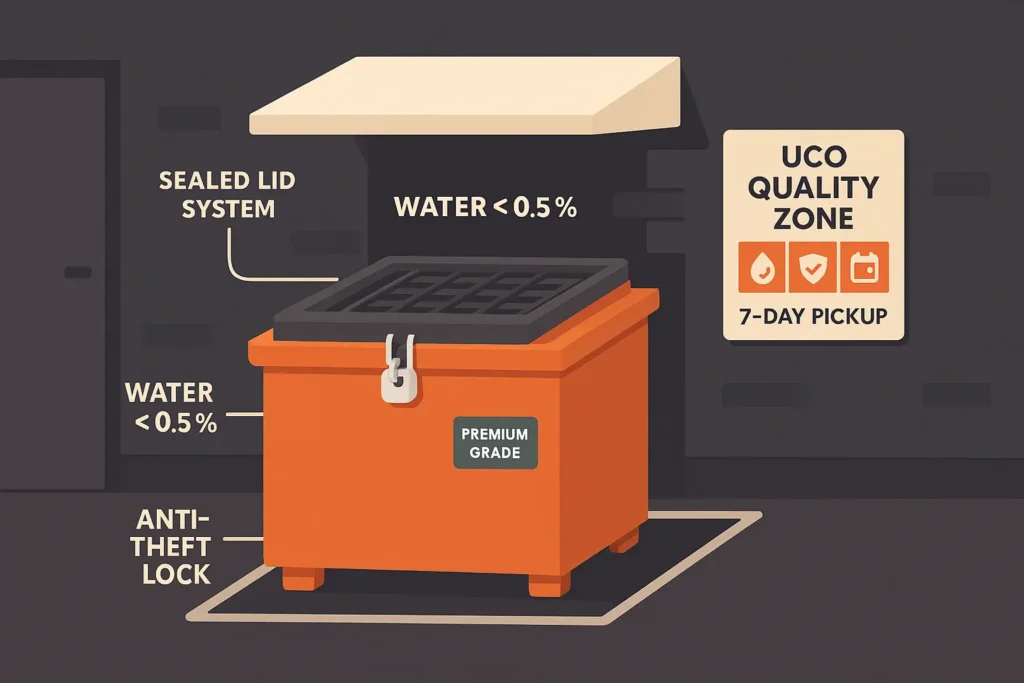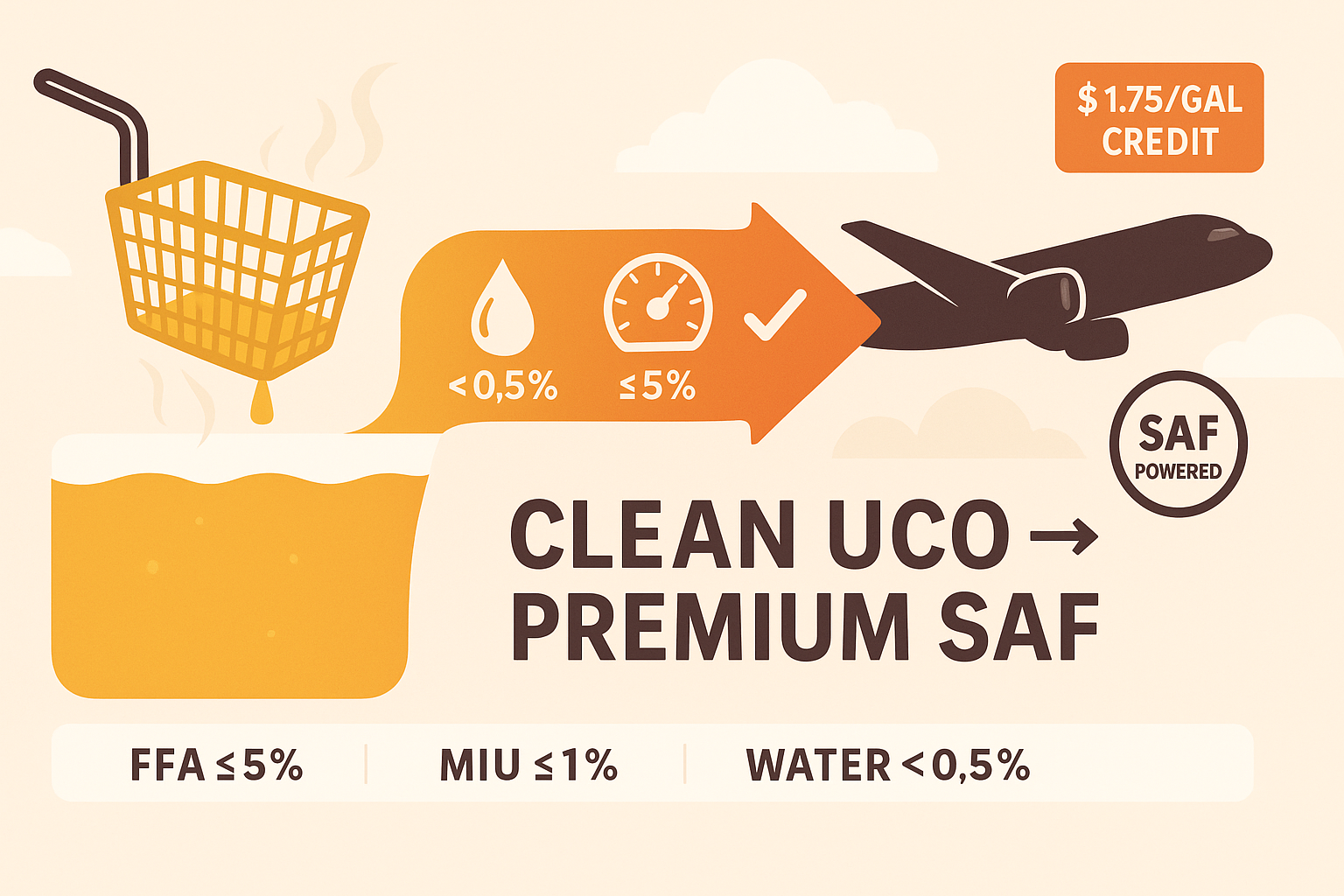Table of Contents
From Fryer to Flight: Why Clean Oil Pays Off
Every jet of Sustainable Aviation Fuel (SAF) starts in a kitchen. The National Renewable Energy Laboratory estimates that U.S. restaurants generate about 1.5 million tons of used cooking oil (UCO) each year, nearly a quarter of all waste fats, oils, and grease. Refiners prize that stream because cleaner oil converts directly into hydroprocessed jet fuel with fewer chemicals and lower greenhouse gas scores under CORSIA.
When the free fatty acid (FFA) level stays below 5 %, a gallon of UCO can return up to 6 % more finished fuel and qualify for a full $1.75 per gallon 45Z clean fuel credit. In short: the purer your oil, the bigger your rebate and the faster America decarbonizes the sky.

What Counts as “High Quality” UCO?
According to Grease Connections price specifications, the U.S. premium grade allows at most 15 % FFA and 2 % MIU (moisture + insoluble + unsaponifiable). Yet biodiesel producers say “good” UCO carries no more than 5 % FFA and 1 % MIU for smooth refinery runs. Water above 0.5 % or acid numbers over 0.5 mg KOH/g trigger off spec penalties.
| Quality Parameter | Target Range for Top Tier SAF |
|---|---|
| Free Fatty Acid (FFA) | ≤ 5 % by weight |
| MIU (moisture + insolubles + unsaponifiables) | ≤ 1 % |
| Water (subset of MIU) | ≤ 0.5 % |
| Peroxide Value | < 10 meq/kg |
| Acid Number (TAN) | < 0.5 mg KOH/g (ASTM D6751 limit) |
These numbers act like a nutrition label for oil. Hit them, and refineries pay premium prices.

The Chemistry Cost Curve: When Impurities Bite
High FFA doesn’t just shave pennies off the ticket; it explodes cost inside the hydrotreater. Free acids polymerize, driving the total acid number up and corroding steel reactors. The refinery must inject extra hydrogen to strip out oxygen, raising energy use and carbon intensity.
Meanwhile, water promotes hydrolysis that creates even more FFA, compounding the problem. Every percentage point above spec can cut SAF yield by roughly two points, according to pilot plant studies on biodiesel methyl ester flows. In dollars, that means a 10 cent dip in UCO value today can balloon into a 20 cent loss downstream. Quality protection is the cheapest hydrogen you’ll ever buy.
Simple Kitchen Habits That Protect Oil Value
The Santa Cruz “Fryer to Fuel” program proved that three daily habits kept water below 0.5 % and FFA under 7 %, doubling rebate checks for local restaurants. Moisture control and crumb filtration matter more than fancy filters. MIU science shows unsaponifiable, not water, drive most refinery shutdowns so keeping lids shut is your first line of defense.
| Habit in the Kitchen | Impact on Quality & Revenue |
|---|---|
| Filter crumbs nightly | Lowers insolubles, protects pumps |
| Close the bin lid every time | Blocks rain; keeps water < 0.5 % |
| Schedule weekly pickups | Cuts FFA rise during storage |
| Store indoors in hot, humid climates | Slows oxidation, keeps peroxide low |
One week of discipline now can raise your annual oil check by four figures.
Choosing the Right Used Collection Company
A reputable used collection company does more than empty bins. It supplies sealed, theft proof containers, records FFA and MIU at pickup, and issues digital certificates for traceability key for SAF credit audits. Ask for independent lab data and proof of ISCC or RSB sustainability certification.
According to Bio Based Diesel Daily, refiners routinely reject loads that lack verifiable chain of custody paperwork. Grease Connections’ network meets these requirements nationwide, arranging rapid service whether you run a food truck in Georgia or a hotel kitchen in Miami (see our Miami service page for details).
Policy & Profit: Clean Oil Unlocks 45Z and CORSIA Credits
Starting in 2025, SAF made from low carbon feedstocks earns a federal credit of up to $1.75 per gallon. The credit is prorated by carbon intensity, which the ICAO CORSIA model calculates from farm to wing.
Because impurities raise hydrogen demand and process energy, every extra percent FFA raises CI scores, trimming credit value. Refiners therefore pay a spread of 10 to 20 cents per pound between “wet, dirty” and “dry, clean” UCO. By keeping your oil on the right side of that line, you share in the upside while helping aviation meet its net zero target.
Your Next Step
Capture the full value of your oil today. Grease Connections will test your current stream, swap in sealed containers, and schedule pickups that match your fry schedule. Ready to boost your rebate? Book a free quality audit or explore our Miami SAF service hub.
According to NREL, Fastmarkets, Bio Based Diesel Daily, K State, EPA, ASTM, ICAO, DOE, and multiple peer reviewed sources cited throughout.









